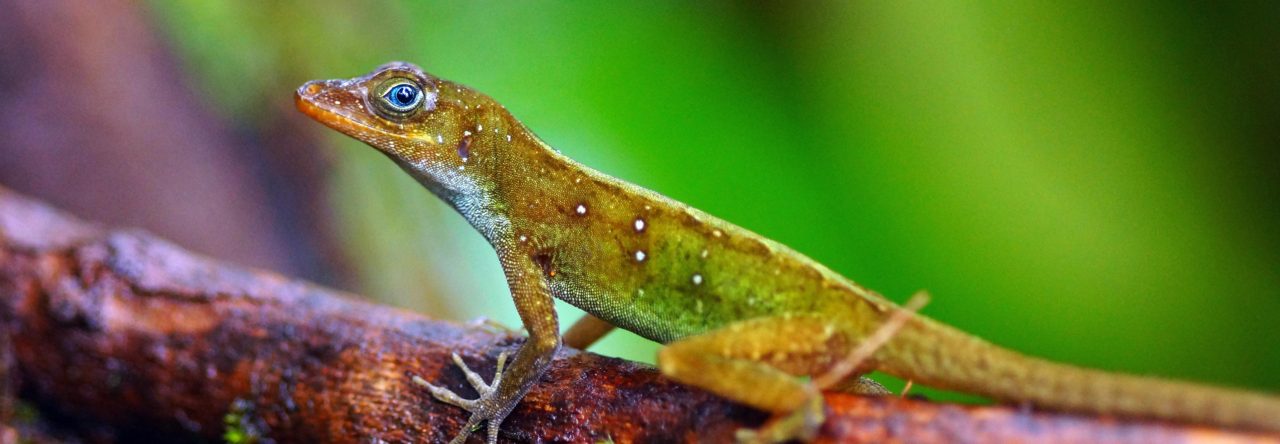How Do You Tell Colombia’s Bright, Zany Anole Lizards Apart?
A group of passionate lizard scientists have published a guide to the dozens of species of Anolis: small, brightly-coloured tree lizards related to iguanas. Colombia holds more than 75 species of Anolis which are and males have large throat fans called dewlaps, to attract females.
Camilo Andrés Estupiñan, a biologist at Icesi University in Colombia and a researcher at the Interandinos Foundation, is currently leading a project to create an illustrated guide of Anolis in Colombia. “Colombia has the greatest diversity of Anolis species in the world, and this book seeks to capture and share that richness,” he says, adding that this is a collaborative effort that came out of the Interandinos Foundation.
“The information available on these species is quite scattered, which represents a great challenge for us, but we have received incredible support from the scientific community, who have contributed significantly,” he says, “Maria, the illustrator of this book, has done an exceptional job, exceeding our expectations with illustrations that accurately capture the unique characteristics of each species.”
Estupiñan explains that this project is crucial not only for biodiversity conservation, but also for fostering knowledge and appreciation of our rich biodiversity, empowering local communities.
“We hope that this book will not be the last of its kind, but will open the doors for future scientific dissemination projects on reptiles in Colombia, contributing to a deeper knowledge and greater conservation of these species,” he says.
Estupiñan explains that in Colombia, local communities such as farmers and indigenous people are “true guardians of the forests” and have direct and constant contact with natural resources.
“They see biodiversity not only as a resource to be conserved, but as part of their identity and can provide valuable data that enriches science,” he says, “In this context, projects such as the Anolis illustrated guide are fundamental, as they not only promote the knowledge and conservation of biodiversity, but also empower these communities.”
Passion For Colombia’s Lizards
Estupiñan was born and raised in Cali, Colombia and says as a child he has always had a deep passion for reptiles. “This passion led me to study biology at Icesi University, where I was fortunate to meet Jhan Carlos Salazar, who was finishing his thesis on the physiology of Anolis lizards,” he says, “He took me to do field work and introduced me to these fascinating lizards, which further ignited my passion for them.”
Estupiñan would go to to start a master’s degree in engineering and teaching undergraduate conservation biology.
“With a clear vision of contributing significantly to research, environmental education and scientific dissemination in Colombia, I founded together with some colleagues and friends the Interandinos Foundation,” he says, “Since its creation, the foundation has allowed me to channel my passion for nature and science into concrete actions that have a real impact on our community and beyond.”
Estupiñan explains that scientists from the Global South bring a deep understanding of their own ecological, social and economic contexts, which is essential for developing sustainable and effective solutions to problems that affect both locally and globally.
“This proximity not only allows for greater precision in identifying problems, but also facilitates the implementation of solutions that are culturally and environmentally appropriate,” he says, “Ultimately, integrating these voices and perspectives into global science is not only right, but also essential to effectively address the environmental, social and developmental challenges we face today.”
More Passion for Anoles
Biologist Jhan Salazar, who is also a collaborator on the illustrated guide, graduated from the Biology Program in 2018 from Icesi University, in Cali, in the south of Colombia and is now pursuing his PhD in Evolution, Ecology and Population Biology at the Washington University in St. Louis.
“My research is focused on Anolis lizards now, but I want to study other lizard genres, snakes, and frogs in the future,” he says, adding that his passion for studying reptiles started back when he was growing up in the country-side of Cauca, Colombia.
“We grew up surrounded by nature and when I was 11, I went out with my family we went on a trip and that really influenced me,” he says, “Its a rural zone and a forested zone.”
In 2019, he was also announced as the winner of the Young Afro-Colombian 2019.
- Evolution in Real Time on Lizard Island - March 23, 2025
- Spider Snags Adult Anolis osa - March 22, 2025
- An Homage to the Green Anoles of New Orleans - March 21, 2025





Kevin de Queiroz
I tried to “like” but the system didn’t recognize my email address.
Kurt Schwenk
Kevin, that’s because the system, undoubtedly run by AI, rejects the notion that you would actually ‘like’ something. Probably assumed you were a fraud.
Jonathan Losos
I’ve wondered that myself!